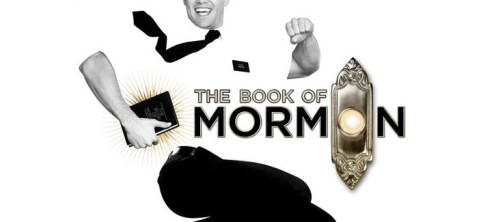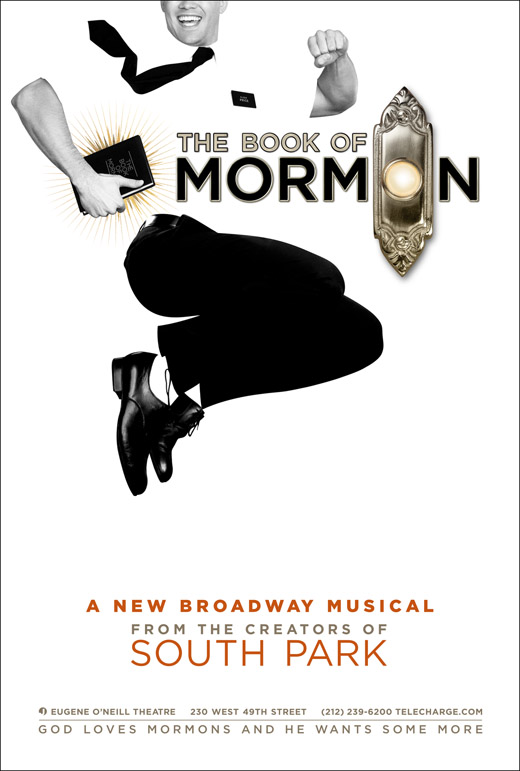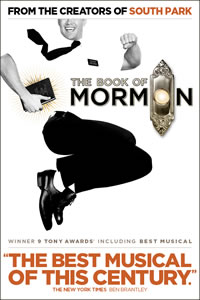Book of Mormon (The)
Musical (2011)

The Book of Mormon was conceived by Trey Parker, Robert Lopez, and Matt Stone. Both Parker and Stone grew up in Colorado, and were somewhat familiar with the Mormon church and its members. Parker had an extensive background in music before meeting Stone; in high school, he was in the chorus of a community theater production of The Best Little Whorehouse in Texas, was piano player for the chorus as well as president of Choir Counsel. He also performed in productions of Grease and Flower Drum Song, and helped build the set for the community theater production of Little Shop of Horrors. The writers became friends at the University of Colorado at Boulder. At the college, they collaborated on a musical film, Cannibal! The Musical (1993), their first experience with musicals. In 1997, they created the TV series South Park for Comedy Central and the 1999 musical film South Park: Bigger, Longer & Uncut. The two had first thought of a fictionalized Joseph Smith, religious leader and founder of the Latter Day Saint movement, while working on an aborted Fox series about historical characters. Their 1998 film, Orgazmo, and the 2003 episode "All About Mormons" of South Park both gave comic treatment to Mormonism.
During the summer of 2003, Parker and Stone flew to New York City to discuss the script of their new film, Team America: World Police, with friend and producer Scott Rudin (who also produced South Park: Bigger, Longer & Uncut). Rudin advised the duo to see the musical Avenue Q on Broadway, finding the cast of marionettes in Team America similar to the puppets of Avenue Q.[9] Parker and Stone went to see the production during that summer, and Lopez, writer-composer of Avenue Q, noticed them in the audience and introduced himself. Lopez revealed that South Park: Bigger, Longer & Uncut was highly influential in the creation of Avenue Q. The trio went for drinks afterwards, and soon found that each camp wanted to write something involving Joseph Smith. The three began working out details nearly immediately, with the idea to create a modern story formulated early on. For research purposes, the trio took a field trip to Salt Lake City where they "interviewed a bunch of missionaries—or ex-missionaries."[10] They had to work around Parker and Stone's South Park schedule. In 2006, Parker and Stone flew to London where they spent three weeks with Lopez, who was working on the West End production of Avenue Q. There, the three wrote "four or five songs" and came up with the basic idea of the story. For the next few years, the trio met frequently to develop what they initially called The Book of Mormon: The Musical of the Church of Jesus Christ of Latter-day Saints. "There was a lot of hopping back and forth between L.A. and New York," Parker recalled.
Lopez pushed for the stage, and his partners concurred. Lopez prodded them to take the project a step further and "workshop" it, which baffled Parker and Stone, clueless about what he meant. Developmental workshops directed by Jason Moore starred Cheyenne Jackson. Other actors in readings included Benjamin Walker and Daniel Reichard. The crew embarked on the first of a half-dozen workshops that would take place during the next four years, ranging from 30-minute mini-performances for family and friends to much larger-scale renderings of the embryonic show. They spent hundreds of thousands of dollars of their own money, still unconvinced they would take it any further. In February 2008, a fully staged reading starred Walker and Josh Gad as Elders Price and Cunningham, respectively. Moore was originally set to direct, but left the production in June 2010. Other directors, including James Lapine, were optioned to join the creative team, but the producers recruited Casey Nicholaw. A final five-week workshop took place in August 2010, when Nicholaw came on board as choreographer and co-director with Parker.
Rudin was named as the producer of the show. Originally, Rudin planned to stage The Book of Mormon off-Broadway at the New York Theater Workshop in Summer 2010, but opted to premiere it directly on Broadway, "[s]ince the guys [Parker and Stone] work best when the stakes are highest." Rudin booked the Eugene O'Neill Theatre and hired key players while sets were designed and built. Rudin expected the production to cost $11 million, but it came in under budget at $9 million. Hundreds of actors auditioned and 28 were cast. When a rehearsal space was found, the work of producing a full-blown musical got under way. Parker and Stone, along with their families, decamped from Los Angeles to New York City shortly after the completion of South Park's fourteenth season in November 2010. The cast and crew then frantically delved into rewrites and rehearsals. The crew did four weeks of rehearsals, two weeks of 'tech', and then went directly into previews. The producers only heard the musical with a full orchestra a mere six days before the first paying audience.
After nearly seven years of development, the show premiered on Broadway in March 2011. The Book of Mormon, since its opening, has garnered positive critical response and numerous theatre award nominations, including fourteen Tony Award nominations. An original Broadway cast recording was released in May 2011, and a United States tour and possible West End production are planned for 2012.
The Book of Mormon contains many religious themes, most notably those of faith and doubt. Although the musical satirizes organized religion and the literal credibility of the LDS Church, the Mormons in The Book of Mormon are portrayed as well-meaning and optimistic, if a little naive and un-worldly. In addition, the central theme that many religious stories are rigid, out of touch, and silly comes to the conclusion that, essentially, religion itself can do enormous good as long as it is taken metaphorically and not literally. The show's creators described The Book of Mormon as "an atheist's love letter to religion."
"The songs, often inspired lampoons of contemporary Broadway styles, are as catchy as they are clever"; "'I Believe' parodies The 'Sound of Music'’s’I Have Confidence." In the Broadway cast recording's liner notes, Frank Rich wrote that The Book of Mormon "scrupulously follows the old testament of Broadway circa 1945–1965, A.D., even while fondly spoofing it". He compares "I Believe” to “Climb Ev'ry Mountain” from The Sound of Music, the opening number "Hello!" to “The Telephone Hour” in Bye Bye Birdie, “Turn It Off” to “I’ll Never Be Jealous Again” from The Pajama Game, and reprise of "Orlando" harkens back to "Tomorrow" from Annie. Other songs, he writes, owe much to the parodies of Tom Lehrer.
Church response)
The response of The Church of Jesus Christ of Latter-day Saints to the musical has been described as "measured". The church released an official response to inquiries regarding the musical, stating, "The production may attempt to entertain audiences for an evening, but the Book of Mormon as a volume of scripture will change people's lives forever by bringing them closer to Christ." Michael Otterson, the head of Public Affairs for the church, followed on April 2011 with measured criticism. "Of course, parody isn't reality, and it's the very distortion that makes it appealing and often funny. The danger is not when people laugh but when they take it seriously—if they leave a theater believing that Mormons really do live in some kind of a surreal world of self-deception and illusion", Otterson wrote, outlining various humanitarian efforts achieved by Mormon missionaries in Africa in recent years.
Stone and Parker were unsurprised by this response: The official church response was something along the lines of 'The Book of Mormon the musical might entertain you for a night, but the Book of Mormon,'—the book as scripture—'will change your life through Jesus.' Which we actually completely agree with. The Mormon church's response to this musical is almost like our Q.E.D. at the end of it. That's a cool, American response to a ribbing—a big musical that's done in their name. Before the church responded, a lot of people would ask us, 'Are you afraid of what the church would say?' And Trey and I were like, 'They're going to be cool.' And they were like, 'No, they're not. There are going to be protests.' And we were like, 'Nope, they're going to be cool.' We weren't that surprised by the church's response. We had faith in them.
Acte I
"Hello" – Price, Cunningham and Mormon Boys
"Two by Two" – Price, Cunningham and Mormon Boys
"You and Me (But Mostly Me)" – Price and Cunningham
"Hasa Diga Eebowai" – Mafala, Price, Cunningham and Ugandans
"Turn It Off" – McKinley and Missionaries
"I Am Here for You" – Price and Cunningham
"All American Prophet" – Price, Cunningham, Joseph Smith, Angel Moroni and Company
"Sal Tlay Ka Siti" – Nabulungi
"I Am Here for You" (Reprise)† – Cunningham
"Man Up" – Cunningham, Nabulungi, Price and Company
Acte II
"Making Things Up Again" – Cunningham, Cunningham’s Dad, Joseph Smith, Mormon, Moroni, Hobbits and Ugandans
"Spooky Mormon Hell Dream" – Price and Company
"I Believe" – Price
"Baptize Me" – Cunningham and Nabulungi
"I Am Africa" – McKinley and Missionaries
"Orlando"† – Price
"Joseph Smith American Moses" – Nabulungi, Mafala and Ugandans
"Hasa Diga Eebowai" (Reprise)† - Nabulungi
"You and Me (But Mostly Me)" (Reprise)† – Price and Cunningham
"Tomorrow Is a Latter Day" – Price, Cunningham, McKinley, Nabulungi and Company
"Hello" (Reprise)†† – Company
†Not on Broadway cast album
††Listed as part of "Tomorrow Is a Latter Day" on the cast album
Elder Kevin Price: A Mormon missionary sent to Uganda, though he wishes to go to Orlando instead.
Elder Arnold Cunningham: Another missionary also sent there. He often weaves characters from Star Wars and The Lord of the Rings into his teachings.
Nabulungi: Mafala Hatimbi's daughter, who dreams of moving to Sal Tlay Ka Siti.
Elder McKinley: One of the lead Mormon elders and the Church's current District Leader in Uganda, he is secretly gay but in denial of his feelings.
Mafala Hatimbi: A member of the Ugandan tribe and Cunningham and Price's tour guide. Nabulungi's father.
General Butt-Fucking Naked: The murderous despot of the village Price and Cunningham are sent to.
Mission President: The leader of the Mormon missionaries
Aucun dossier informatif complémentaire concernant Book of Mormon (The)
Aucun dossier informatif complémentaire concernant Book of Mormon (The)

Version 1
Book of Mormon (The) (2011-03-Eugene O'Neill Theatre-Broadway)
Type de série: Original BroadwayThéâtre: Eugene O'Neill Theatre (Broadway - Etats-Unis) Durée : Se joue actuellementNombre : 28 previews - Première Preview : 24 February 2011
Première: 24 March 2011
Dernière: Open endMise en scène : Casey Nicholaw • Trey Parker • Chorégraphie : Casey Nicholaw • Producteur : Star(s) : Commentaires : Taking Broadway and the rest of the world by storm, when this outrageous musical comedy officially opened at the Eugene O’Neill Theatre on March 24, 2011 (following previews from February 24), it wowed audiences and critics alike with the New York Times even hailing it as "the best musical of the century." The show went on to collect an astonishing nine Tony Awards, including “Best Musical” and has been one of the top-selling shows on the Great White Way ever since.Presse : Les critiques sont excellentes:
"A newborn, old-fashioned, pleasure-giving musical has arrived." Ben Brantley for New York Times
"The show is blissfully original, irreverent, outspoken and hilarious. And all that's tucked inside good -- no, great -- old-fashioned musical." Joe Dziemianowicz for New York Daily News
"It’s a fiendishly well-crafted, hilariously smart — or maybe smartly hilarious — song-and-dance extravaganza. The show’s a hoot. The show’s a hit." Elisabeth Vincentelli for New York Post
"Like several shows this season, “Book of Mormon” is too long and comes close to wearing out its welcome before redeeming itself with a strong second act. And like most 12-year-old-boys, it isn’t nearly as nasty as it would have us believe. Not that there’s anything wrong with that." Jeremy Gerald for Bloomberg
"Manages to combine outrageous parody, solid storytelling, and sympathetic yet goofy characters." David Sheward for Back Stage
"One of the most purely enjoyable musicals in years." Robert Feldberg for The Record
"Brilliantly original, hysterically funny and tunefully irresistible." Roma Torre for NY1
"In a season of tuners mostly derived from old movies, stories and songs, it’s a gold-plated Broadway miracle to encounter something so new and audaciously fresh in every respect of the word." Michael Sommers for Newsroom Jersey
"The defining quality of this hugely entertaining show is its sweetness... One of the freshest original musicals in recent memory. It has tuneful songs, clever lyrics, winning characters, explosive laughs and disarmingly intimate moments." David Rooney for Hollywood Reporter
"Every song enhances the hilarity, expert staging heightens every gag, and the cast of fresh faces is blissfully good… Approaches musical-comedy Rapture" Steven Suskin for Variety

Version 2
Book of Mormon (The) (2013-03-Prince of Wales Theatre-London)
Type de série: Original LondonThéâtre: Prince of Wales Theatre (Londres - Angleterre) Durée : 6 ans 11 mois 3 semaines Se joue actuellementNombre : Première Preview : 25 February 2013
Première: 21 March 2013
Dernière: Open endMise en scène : Casey Nicholaw • Trey Parker • Chorégraphie : Casey Nicholaw • Producteur : Star(s) : Avec: Gavin Creel (Elder Price), Jared Gertner (Elder Cunningham), Mark Anderson, Stephen Ashfield, Benjamin Brook, Daniel Buckley, Daniel Clift, Ashley Day, Terry Doe, Candace Furbert, Patrick George, Nadine Higgin, Tyrone Huntley, Evan James, Chris Jarman, Michael Kent, Alexia Khadime, Matt Krzan, Oliver Liddert, Daniel McKinley, Luke Newton, Terel Nugent, Haydn Oakley, Olivia Phillip, Lucy St. Louis, Giles Terera, Kayi Ushe, Tosh Wanogho-Maud, Liam WratePresse : Les critiques sont bonnes:
"While acknowledging that it is often damnably clever and sharp, I find it hard to warm to the show...The Book of Mormon strikes me as a decadent and self-indulgent musical, and its mixture of satire and syrup ultimately proves repellent." Charles Spencer for Daily Telegraph
"I absolutely loved it...songs, though not especially memorable, have bounce and bite and colour." Paul Taylor for The Independent
"I’m not sure its crude yet clever package is roll-in-the-aisles funny but it’s deliciously entertaining and there is certainly nothing like it in the West End." Julie Carpenter for The Daily Express
"Its satire is insistently US college-campus adolescent. I tired of it after ten minutes...This is a cowardly, coarse, cynical show, worth avoiding. Quentin Letts for The Daily Mail
" Indecently funny...The music...is generally jaunty and from time to time soars operatically, though only three or four of the tunes are really memorable.
Henry Hitchings for Evening Standard
"A mildly amusing musical, with some knowingly parodic songs, that takes a few pot shots at religious credulity without ever questioning the need for belief. I had a perfectly pleasant time, but the idea that the show, which won nine Tony awards, is either daringly offensive or a Broadway breakthrough is pure codswallop...For all its rude words, this is essentially a safe, conservative show for middle America."
Michael BIllington for The Guardian
Trailer
Book of Mormon (The) (2013-03-Prince of Wales Theatre-London)
Qualité: ***** Intérêt: ***
Langue: Anglais Durée: